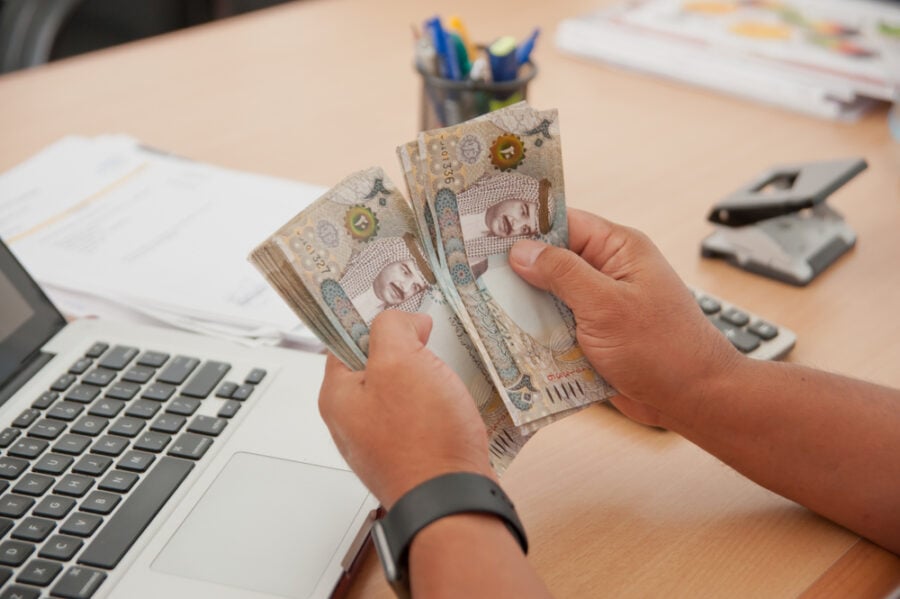The banking sector in Bahrain is set to benefit from the expected hikes in interest rates, assuming banks adopt a pragmatic approach by not reflecting the rate increases systematically as this could cause borrowers to default.
Releasing a study titled ‘Bahrain Banking Sector 2022 Outlook: Edging Closer to Pre-Pandemic Profitability,’ S&P Global Ratings said Bahrain’s economic recovery in 2022 is driven by higher oil prices and increasing regional activity. Additionally, the report mentioned that the increased mobility and improved business and consumer sentiment will support a recovery in the kingdom’s banking sector.
The rating agency had revised its outlook for Bahrain’s credit rating from “negative” to “stable” following Bahrain’s financial reforms aimed at improving non-oil revenues and reducing government expenditure.
Late last year, Bahrain announced a major national economic growth and fiscal balance plan, aimed at reducing expenditure and introducing new revenue initiatives. It is expected to achieve economic growth of 3.1% in 2022.
Bahrain’s banking sector: conventional and Islamic banks
The Bahraini banking sector has played a crucial role in supporting the macroeconomy over the past two years, by helping the society and country face the repercussions of the Coronavirus.
In fact, the Bahraini banking sector consists of both conventional and Islamic banks. According to the Central Bank of Bahrain figures, the total number of financial institutions reached 367 at the end of September 2020, including 31 retail banks, 62 wholesale banks, 17 foreign banks’ branches, and 8 representative offices. Moreover, these institutions include 34 insurance companies, 53 investment business firms, and 86 specialized licensees.
According to the Financial Stability Report issued by the Central Bank of Bahrain, the total assets of the banking sector amounted to $217.5 billion at the end of 2021, equivalent to 6.5 times the gross domestic product. The retail banks’ share amounted to $99.4 billion while wholesale banks’ amounted to $118.1 billion. As for the value of the Islamic banking sector, it amounted to $34.6 billion.
Total domestic deposits recorded a growth of 4.2% at $35.5 billion in 2021. At the same time, the return on assets reached 1.1% as of December 2021, a jump from 0.7% at the end of 2020, with an increase in return on shareholders’ equity to 7.8%, up from 2.6% during the same period.
Standard & Poor’s expects the private sector to drive deposit growth in 2022.
Increase in interest rates
In its report, S&P ratings agency states that Bahrain’s banks will benefit from the increase in interest rates. It expects the Central Bank of Bahrain to mirror the Federal Reserve’s planned interest rate hikes, which will benefit banks in Bahrain.
The US Federal Reserve meeting will be held on March 15-16. According to CME Group, the world’s leading and most diversified derivatives market, 90.5% of analysts expect the rate to rise between 0.25 and 0.5%, and the rest of the analysts expect the rate to rise by between 0.5 and 0.75% annually.
Standard & Poor’s calculates a 7.4% increase in net banking income for every 100 basis-points increase and believes that Bahraini banks’ profitability will keep improving while reaching pre-pandemic levels by 2023.
Additionally, it expects that investing in technology and the use of digitization to improve operations will be a key focus area.
Strong Capitalization
Despite lower profitability in 2020-2021, the banking sector was supported by strong capital buffers. With an increase in profitability likely, banks are expected to further strengthen their capital buffers.
Furthermore, according to the report, as profitability improves, banks will start paying dividends at pre-pandemic levels from 2022.
Credit growth supported by economic recovery
Standard & Poor’s predicts that asset-quality deterioration will remain contained as the economy improves and corporate activity recovers, and “part of the deterioration will come from deferred exposures once the Central Bank of Bahrain (CBB)’s support measures are lifted and loans to companies in still-vulnerable sectors (including real estate, hospitality, and small and medium enterprises) are reclassified”.
At the end of last year, the CBB ordered all banks and finance companies operating in the country to grant customers a six-month deferment option (ending on June 30, 2022), without any fee or increase to the installment amount, as part of its previously enacted measures to limit economic repercussions of Covid-19.
It is also expected that credit growth will pick up slightly to 5% – 6%, supported by the economic recovery and improving business and consumer sentiment.
The Impact of the Russia-Ukraine war is limited… for now
It is important to note that the direct impact is likely to be limited given rated banks’ limited exposure to Russian and Ukrainian counterparties.








